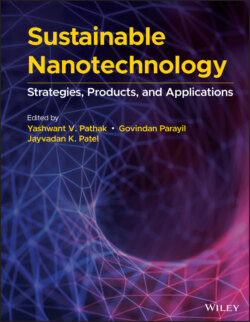Читать книгу Sustainable Nanotechnology - Группа авторов - Страница 95
3.15 Conclusion
ОглавлениеConverting NT into green and eco‐friendly NT by means of using bottom‐up preparation techniques of green chemistry allows us to decrease the risks associated with it to various industrial applications and resembles the many characteristics of ideal technology [89]. Being a general‐purpose technology with characteristics like pervasiveness, improvement, and innovative opportunities, NT has its roots and branches in almost all parts of science and technology applications in society. The fear of adverse effects of nanomaterials on user health and environment is also possible to take care by choosing green synthesis methods at room temperature processes. The United Nations identified 17 SDG in the year 2015, for global prospectus of humanity as systematic development objectives to be realized by 2030 with a timeframe of 15 years. These SDG goals can be realized using two general‐purpose technologies of the twenty‐first century that include NT and ICCT, in which NT has a major role to support 12 goals for realization. The opportunities and challenges of GNT in major part of primary, secondary, tertiary, and quaternary industry sectors encourages and accelerates the growth and acceptance of technology by enhancing investments and support NT usage by every country.
Table 3.8 SD goals, suitable technologies and focus on different industry sector to achieve them.
| Goal No. | Focus issue | Technology | Focus of technological solutions in different industry sectors |
|---|---|---|---|
| 1 | Reduce poverty | NT | Green nanotechnology in primary sector with focus on agriculture industry |
| 2 | Reduce hunger | NT | Green nanotechnology with a focus on food preservation, transportation, and even preparation of artificial food |
| 3 | Health and well‐being | NT | Green nanotechnology in healthcare and environment cleaning |
| 4 | Quality higher education | ICCT | Education technology using ICCT and nanotechnology in the tertiary sector |
| 5 | Gender equality | ICCT | Awareness and equal opportunity creation using ICCT‐based education |
| 6 | Clean water and sanitation | NT | Green nanotechnology in primary and secondary industry sectors |
| 7 | Affordable renewable energy | NT | Green nanotechnology for highly efficient renewable energy generation and storage |
| 8 | Decent employment | NT and ICCT | Green nanotechnology together with ICCT created skilled jobs and employment |
| 9 | Sustainable industrialization | NT and ICCT | Green nanotechnology together with ICCT provides industry 4.0 and industry 5.0 based mass customization and total automation in all industry sectors |
| 10 | Reduced inequalities among countries | — | Through technology transfer and cooperation between the countries through free trade |
| 11 | Safe and sustainable cities and communities | ICCT and NT | Green nanotechnology together ICCT supports to create smart cities integrated industrial facilities |
| 12 | Ensure sustainable production and consumption | NT and ICCT | Green nanotechnology together with artificial intelligence and IoT supports sustainable production and consumption of essential commodities |
| 13 | Combat on climate change | NT | Green nanotechnology supports to control environmental degradation and provides the optimum solution to clean the environment and helps to combat climate change |
| 14 | Conserve ocean and marine resources | NT | Green nanotechnology is capable enough to clean the ocean to conserve marine resources |
| 15 | Protect life on land | NT | Green nanotechnology in the healthcare sector, strong shelter, and pollution‐free clean environment through nanotechnology can protect life on the planet |
| 16 | Ensure peace and justice | ICCT | Communicate and collaborate using ICCT for peace and prosperity |
| 17 | Global partnership for sustainability | ICCT | Communicate and collaborate using ICCT for resource sharing |
